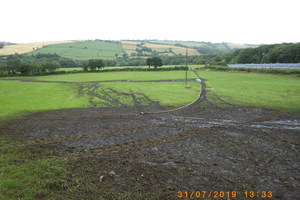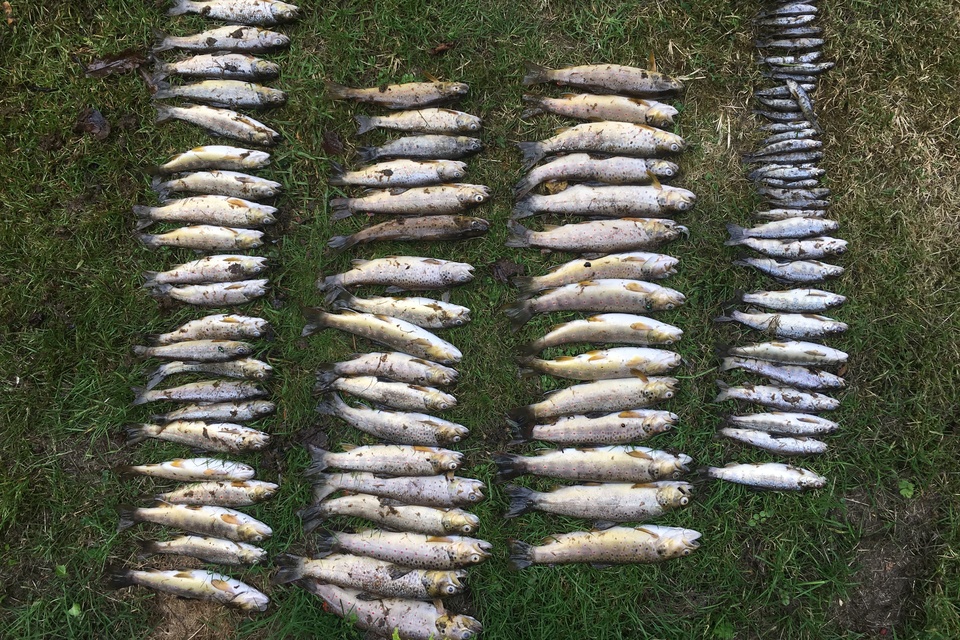North Devon company fined for pollution that devastated fish population
The North Devon company that caused a pollution incident leading to a devastating fish kill on the River Mole near South Molton has been fined £2,000 and ordered to pay £9,836 in costs.

Digestate made its way to the river after heavy rain washed it off the land
The company, A J Sing and Son Ltd, of Pillavins Farm, near South Molton, pleaded guilty when they appeared at Exeter Magistrates Court on Wednesday 28 July 2021.
Ryan Adams, an employee of A J Sing and Son Ltd at the time of the incident, also pleaded guilty, and was fined £667 with costs of £2,000.
On Wednesday 31 July 2019, Environment Officers were called to a fish kill on the River Mole near South Molton. They recorded more than 9,000 dead fish, including salmon, brown trout, sea trout, bullheads, stone loach and minnows, in the 4.7 kilometre stretch of the Mole and estimate that the total number of dead fish was around 15,600. Whole populations of salmonids, from mature adults to fry, were wiped out.

Some of the thousands of dead fish recorded
Environment Officers found the cause of the fish kill to be anaerobic digestate that had been deposited onto fields the previous day by the company A J Sing and Son Ltd. The deposit of digestate was from a leaking pipe which had been spilt on 30 July 2019, during land spreading operations, and left on the land. The digestate made its way to the river after heavy rain washed it off the land into a tributary of the River Mole.
Alun and Amanda Sing are directors of A J Sing and Son Ltd, which grows crops to feed the anaerobic digestion plant operated nearby by Condate Biogas Ltd. The resulting digestate is then tankered back to Pillavins Farm by Condate, where it is stored in a lagoon.
Pillavins Farm lies on the south side of the A361 North Devon link road near South Molton and at the time of the incident digestate was being spread on fields lying more than 1 kilometre away from the lagoon, on the opposite site of the road.
To reach the fields, pipework took the digestate through a rainwater culvert under the A361 and pumps were used to maintain the pressure needed to push the digestate the long distance.
The pipework was left in place for several days and Mr Adams, the company’s sole permanent employee, restarted the spreading operation on 30 July, assisted by two self-employed sub-contractors.
The court heard that A J Sing and Son Ltd were negligent in that they did not have systems in place to ensure that the proper checks had been made and to ensure that spills were properly dealt with; they used a method of delivery of digestate and equipment that introduced avoidable risks and used equipment that leaked.
They also heard that Ryan Adams was negligent in spreading digestate when rain was forecast and in not cleaning up the spill.
In court the Judge DJ Matthews quoted an Environment Agency fisheries enforcement officer, who said “the fish kill was the worst he had seen in 30 years”.
Environment Officer Nicola Rumsey said:
“This was a truly shocking fish kill, on a previously pristine salmon river. It was one of the largest fish kills ever recorded in Devon and Cornwall.
“The discharge of digestate into the river had a devastating effect on the fish population. It may take a number of years for the fish population to fully recover.
“Great care must be taken when applying digestate to land. Simple observation of the weather forecast and the forecast of rain should have been enough to halt the digestate spreading.
“Only the right amounts of digestate must be evenly spread over land at appropriate times and when there is a crop or soil need. It should not be spread on steeply sloping land, close to field ditches and watercourses, on saturated or waterlogged land or prior to heavy rain falling. No digestate should be allowed to discharge to a watercourse.”
If you see pollution or dead fish in a river, contact our 24/7 incident hotline on 0800 807060.
Notes to editor
Anaerobic digestion (AD) is the breakdown of organic material by micro-organisms in the absence of oxygen. AD produces biogas, a methane-rich gas that can be used as a fuel, and digestate, a source of nutrients that can be used as a fertiliser.
The charges:
A J Sing and Son Ltd pleaded guilty to the following offence:
Between 29 July 2019 and 1 August 2019 on land at Gortonhill Moors, South Molton you caused a water discharge activity not under or to the extent authorised by an environmental permit, namely by the deposit of organic matter derived from an anaerobic digestion plant on to said land, which subsequently entered the river Mole. Contrary to Regulations 12(1)(b) and 38(1) (a) Environmental Permitting (England and Wales) Regulations 2016.
Ryan Adams pleaded guilty to the following offence:
Between 29 July 2019 and 1 August 2019 on land at Gortonhill Moors, South Molton A J Sing and Son Limited caused a water discharge activity not under or to the extent authorised by an environmental permit, namely by the deposit of organic matter derived from an anaerobic digestion plant onto said land, which subsequently entered the river Mole and said water discharge activity was caused by an act or default on your part. Contrary to regulations 12(1)(b) and 38(6) Environmental Permitting (England and Wales) Regulations 2016.